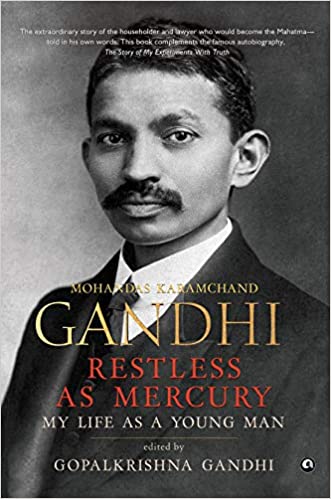GANDHI RESTLESS AS MERCURY (HB)
GOPALKRISHNA GANDHI read English Literature at St Stephen?s College, Delhi. A former administrator and diplomat, he has translated The Tirukkural from the Tamil, authored a novel, Refuge, and a play in English verse, Dara Shukoh. He is currently Distinguished Professor at Ashoka University. ... Read more Read less
M. K. Gandhi?s autobiography, the story of My experiments with truth, is famously incomplete, stopping abruptly in 1920. But while he gave up writing his memoirs, Gandhi continued to speak and write about his life, family, work, colleagues, those who opposed and Venerated him, his hopes, anxieties, challenges, fasts, many jail stints, his Enthusiasms, and disappointments. When knitted together, these autobiographical observations, scattered over several pages of the collected works of Mahatma Gandhi, as well as in some works that were published in his lifetime under his gaze, make for a gripping and powerful story. ?Restless as Mercury?, is how his only sister, raliyat, described the young Mohandas and her stunningly accurate characterization of her brother provides the title of this work, which Gopalkrishna Gandhi has reconstructed from Gandhian own words. The account is divided into six sections: book I starts with Gandhi?s birth in 1869 and focuses on his early years in Gujarat, his schooling, immediate family, and marriage to Kasturba. In book II, we see him away from his home and family in a new environment?england?where he goes to study law. He continues his commitment to vegetarianism and engages in a brief flirtation with becoming an English gentleman. He then makes a quick visit home to Rajkot before going to South Africa to practise law. There, he experiences racial prejudice and struggles to balance the demands of home and public life. In book III, we see Gandhi being drawn into two Wars in South Africa?The anglo?boer war (1899?1902) and the bambatha rebellion (1906). he sets up the ambulance Corps with other Indians, becomes politically engaged, and starts fighting for the rights of Indians in South Africa. It is during this period that he starts his journal, Indian opinion, and his first ashram in durban?the Phoenix settlement. As his ethics and values firm up, he finds himself in a battle at home with his wife, Kasturba. In book IV, as Gandhian politics come under assault by all three major sections of South African population?the ruling European, the majority African, and the minority asian?his belief in non-violent struggle becomes stronger and his idea of satyagraha comes to the fore. He begins courting imprisonment and encourages his friends, family, and fellow Indians to do so as well. In book V we see that his deep and constantly renewed bonds with the family have to reckon with his commitment to the larger cause. It is in this period that Gandhi sets up Tolstoy farm for the families of the satyagrahis. Book VI sees him leading disciplined mass movements the likes of which have not been seen before. When all the demands of the South African satyagraha are conceded, Gandhi decides the time has come for him to return to India. Accompanied by Kasturba, he leaves South Africa for India in 1914 for the great appointment with history that awaits him in the motherland. Restless as Mercury is a candid and unflinching account of the struggles, experiences, and philosophies that informed and influenced the young Mohandas. It also shows how Gandhi kept, not without Stumbling, his love of family in step with his sense of his public duties. ... Read more Read less











